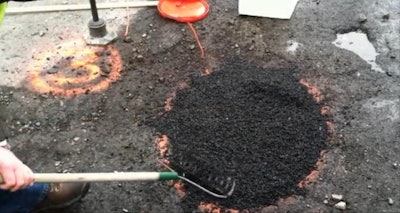 Aquaphalt’s asphalt alternative for filling potholes is installed during a test in Boston.
Aquaphalt’s asphalt alternative for filling potholes is installed during a test in Boston.According to a report from our sister publication Better Roads, the city of Boston is considering three alternatives to asphalt for repairing potholes.
Because the materials are more expensive than asphalt, the main benefit is that they fill potholes faster, are more friendly toward the environment and can be easily transported in bags and buckets.
The first material, from a company called Aquaphalt, is poured from a bucket into the pothole, then raked and packed down. Another from Unique Paving Materials hardens on the surface while staying elastic beneath in order to allow it to move with the asphalt beneath it, even through freeze cycles.
While the first two would be used as permanent pothole fixes, the third material, called Hole Patch, is a putty-like material stored in plastic bags that would only provide a temporary fix. This stuff behaves much like that science experiment you tried in school by mixing cornstarch and water.
The thick liquid isn’t removed from its bag and is instead simply placed in the pothole. Whenever a vehicle drives over Hole Patch, the pressure stimulates the liquid and makes it solid for an instant, before liquefying again.
The materials are currently being tested by the city.








